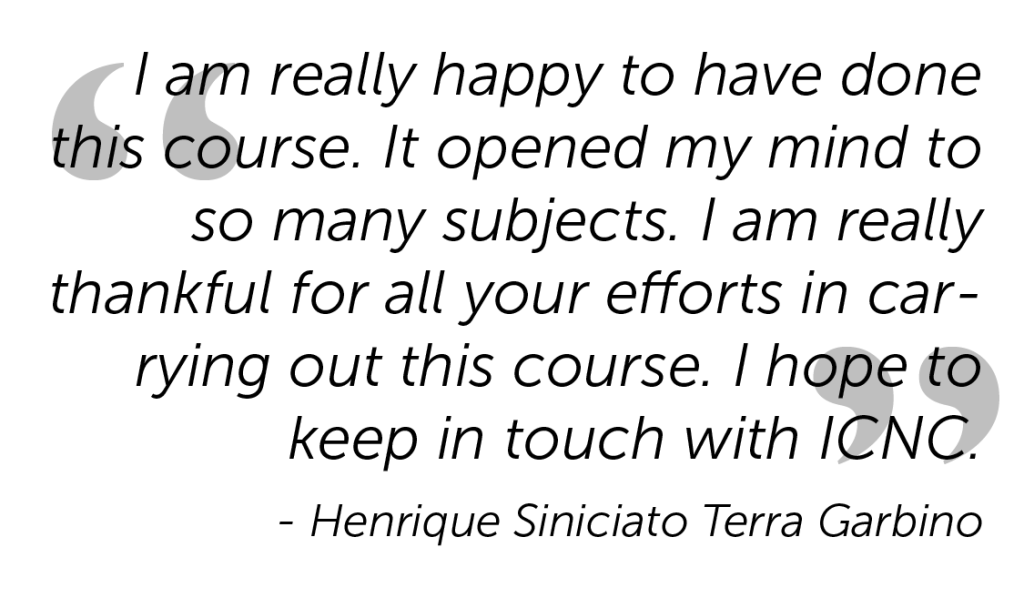Call for ICNC's Free 2020 Moderated Online Course on Civil Resistance
The application window closed on Sunday, September 13, 2020
Course Dates: October 1 through November 20, 2020
 For the ninth consecutive year, the International Center on Nonviolent Conflict (ICNC) will host our annual free, moderated online course, “People Power: The Strategic Dynamics of Civil Resistance.”
For the ninth consecutive year, the International Center on Nonviolent Conflict (ICNC) will host our annual free, moderated online course, “People Power: The Strategic Dynamics of Civil Resistance.”
In this course, over 50 highly motivated and collaborative participants from around the world will join with selected moderators to:
- Study scheduled modules of selected readings, videos, and pre-recorded experts and practitioners’ input on key aspects of nonviolent resistance campaigns and movements;
- Participate in moderated online discussion forums by sharing thoughts and ideas about course content that will help deepen individual learning;
- Share experiences and stories related to course themes to build a collaborative learning community with other learners.
Read the detailed information below.
Basic Details and Application Info
This 7-week online course provides an interactive, in-depth, and evidenced-based perspective on nonviolent civil resistance movements and campaigns. Here are the details:
Course Dates
The course will run from October 1 – November 20, 2020. Applications are due September 13 and participants will be notified of their application status by September 24.
Online Platform
The course will take place on ICNC’s online learning platform, and begin with a live orientation webinar on September 30 that guides admitted participants through signing up, logging in, interacting in the online space, and getting the most out of their online learning.
Time Zone Flexibility
Participation in the class is not restricted by time zone. Course content, forums, and posts are all accessible to participants at any time of day. Outside of the introductory webinar, people do not have to be online at the same time as others—you will be completely in charge of when you log on to do your work.
Course Moderators
Moderators will include selected members from the ICNC staff and Academic Council. Moderators will include various scholars, trainers, and activists who will interact with course participants in the discussion forums and provide further insight on the course topics.
Types of Activities
The course will involve an international learning community in a number of activities to be completed within specific time frames, readings, viewing videos, and active engagement with weekly discussion forums.
Course Goals
The goals of this course are:
- To introduce cutting edge thinking and research findings on various topics in civil resistance, as outlined in the course content below.
- To discuss case studies of nonviolent campaigns and movements.
- To reflect on the effectiveness of civil resistance and its power to overcome challenging conditions.
- To provide a platform for peer-to-peer learning and networking.
- To offer an interactive and structured learning environment for participants to become a more informed observer of nonviolent conflicts and effective conveyor of civil resistance knowledge.
Course Schedule*
Module 1. Introduction to the Course
Welcome and Orientation Webinars • Participant Introductions • Present Knowledge Survey
Module 2. Foundations of Civil Resistance
What Is Civil Resistance? • The Effectiveness of Civil Resistance
Module 3. Cases of Civil Resistance Around the World
National Liberation Cases • Civil Safety/Autonomy Cases • Defense/Expansion of Rights Cases • Public Accountability Cases
Module 4. Strategy and Tactics of Civil Resistance
Analyzing Nashville Lunch Counter Campaign • The Role of Women in Civil Resistance • Strategy, Tactics, and Conflict Analysis Tools
Module 5. Repression, Backfire, and Defections
Repression and Backfire • Movement Strategies for Defections
Module 6. Violent Flanks, Agents Provocateurs, and Maintaining Nonviolent Discipline
Violent Flanks • An Inoculation Guide Against Agents Provocateurs • Maintaining Nonviolent Discipline
Module 7. New Frontiers in Civil Resistance Studies
Democratization and Civil Resistance • Civil Resistance against Abusive Corporate Practices • Civil Resistance and Faith Communities • Cultural Resistance
Module 8. Completing the Course
Course Evaluations • Learning Gains Survey
*Course schedule is subject to some minor modifications before the course launches.
Who Should Apply
 We encourage any movement activists, organizers, scholars, educators, members of civil society, policy professionals, and journalists to apply to take this course–if you think the course will help you participate, support, analyze nonviolent peoples’ movements for human rights, political freedom, social justice, and environmental sustainability more effectively.
We encourage any movement activists, organizers, scholars, educators, members of civil society, policy professionals, and journalists to apply to take this course–if you think the course will help you participate, support, analyze nonviolent peoples’ movements for human rights, political freedom, social justice, and environmental sustainability more effectively.
Every year, we have over 150 people apply for the course. On average, we only accept 50-60 participants. For this class, we are looking for participants from all over the world who:
- Have strong personal motivations to learn and apply their knowledge of what makes civil resistance struggles effective;
- Are willing to engage with other participants and share their knowledge and experience about nonviolent movements and campaigns in respectful and collaborative ways, even when they disagree;
- Are comfortable/proficient in writing, reading and speaking in English; and
- Are committed to meeting the work expectations and the participant code of conduct as outlined below
Expectations of Participants
 Work and Time Commitment
Work and Time Commitment
All participants are expected to spend a minimum of 7-10 hours per week in the online classroom, and should average at least 1 hour per day for the full duration of the course. The course work involves reviewing materials, posting comments about the readings and assigned videos, and interacting with/responding to other participants’ posts.
Meeting these requirements is essential to the learning experience for all participants. Course content released each week builds on past content; therefore learning is interrupted and ineffective when participation is irregular. In addition, we believe that all of our participants have important contributions to make to the learning experience. Lack of participation and irregular or no posting are therefore a disservice to other participants and may involve removal from the course.
Certificate of Completion
A certificate of completion will be awarded, upon request, to participants who fulfill all requirements for satisfactory completion of the course. This requires:
- Reviewing all required materials in each course module;
- Completing all quizzes and surveys set up in the modules;
- Posting relevant comments about the readings and assigned videos in all required forums in each course module;
- Interacting with/responding to other participants’ posts in all required forums in each course module;
- Spending at minimum 7-10 hours per week in the online classroom, averaging about 1 hour per day for the duration of the course on reviewing materials, posting comments and interacting with/responding to other participants’ posts.
If requested by a participant and awarded by ICNC, a certificate of completion will be sent by email in PDF format within three weeks after the end of the course.
Frequently Asked Questions
1. “Is ICNC planning to run another one of these online courses at some point?”
Yes, we have been running it once a year for several years now and we plan to keep offering it (and other online courses) at least once annually into the future. We would love to have you apply for this course now, but if the time is not right for you, you can rest assured that we plan to offer it again in the future.
2. “Should I still apply if I won’t be able to meet all of the participation expectations of the course?”
Preference in admission will be given to those who can commit fully to the stated course requirements, including a minimum average commitment of 1 hour per day. We cannot guarantee an admission for those who cannot commit to the course requirements though they can still submit their online application for our consideration and add a note regarding how much they can commit to if, for various reasons, they cannot take the full course load.
3. “What is the anticipated knowledge level of participants? How much are they supposed to know about civil resistance or have experience with it?”
It is beneficial if most applicants have some level of practical experience or some basic knowledge of nonviolent resistance or both. This will contribute to deeper and more meaningful exchanges and engagements with other students. Having said that, applicants with no prior experience or knowledge of the subject will not be automatically rejected if they demonstrate that the course will be important for them in planning for, launching, or studying civil resistance actions in the short to mid-term time frame.
4. “What advice do students from previous participant-led course have for those applying for this course?”
Here is what previous students for this course advise:
- Go through the course material early in each module;
- Write about and post your initial responses to the course material before you start reading the comments of others;
- Scan other participants’ comments, and respond to at least one or two in every forum you are engaged in–and more if you feel grabbed by what people are talking about. If you have expertise and can offer support, wisdom or thoughtful questions, do so;
- Quote key parts of the posts you are responding too in a different font from the text of your response;
- Get into a habit of spending an hour or two a day working on this course. Frequent visits to the website and nearly daily work helps with digesting and synthesizing all this new information;
- It often helps to go back to review the course material toward the end of a module after your initial overview and forum discussions get started;
- Work hard to keep up with your work—for your sake and the sake of other participants;
- It is helpful to sign up for daily email digests for discussion topics, especially at the beginning of the course. However, as the course progresses and the responses are spread among many forums, there will be a time when you need to read the forums in context so you know what they are about;
- Ask for help from other participants or the course administrator when necessary;
- Validate other participants and encourage the full participation of others. Reach out to participants you haven’t heard from recently and tell them how much you appreciate their participation;
- Stay curious and try to learn as much as possible.
Apply Here!
The application window for this learning opportunity has now closed. Applicants will be informed of their application status by September 24, 2020. Please email icnconlinecourses@nonviolent-conflict.org if you have any questions.
